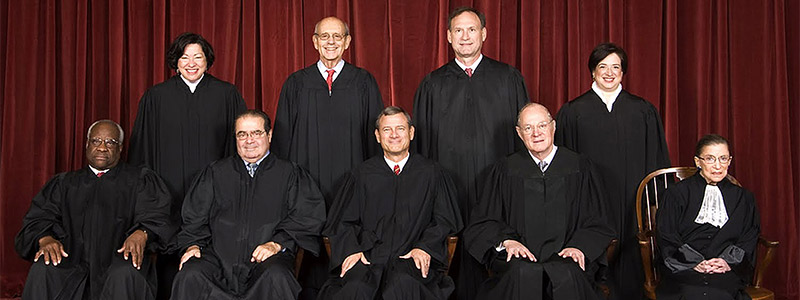Scalia’s Scathing Dissents
 Supreme Court Justice Antonin Scalia wasn’t shy. Known for his quick wit as much as his sharp legal mind, he was, in the words of playwright John Strand, “a puncher.” Here are a few colorful quotes from his dissents.
Supreme Court Justice Antonin Scalia wasn’t shy. Known for his quick wit as much as his sharp legal mind, he was, in the words of playwright John Strand, “a puncher.” Here are a few colorful quotes from his dissents.
King v. Burwell: In June 2015, the Supreme Court ruled 6-3 to keep Obamacare intact.
“The Court’s next bit of interpretive jiggery-pokery involves other parts of the Act that purportedly presuppose the availability of tax credits on both federal and state Exchanges. [. . .] Pure applesauce.”
Obergefell v. Hodges: After the Court ruled in support of gay marriage, Scalia pointedly critiqued the opening lines of Justice Anthony Kennedy’s majority opinion.
“If, even as the price to be paid for a fifth vote, I ever joined an opinion for the Court that began: ‘The Constitution promises liberty to all within its reach, a liberty that includes certain specific rights that allow persons, within a lawful realm, to define and express their identity,’ I would hide my head in a bag. The Supreme Court of the United States has descended from the disciplined legal reasoning of John Marshall and Joseph Story to the mystical aphorisms of the fortune cookie.”
United States v. Virginia: In a 7-1 vote, the Court ruled against the Virginia Military Institute’s policy of admitting only men.
“If it were impossible for individual human beings (or groups of human beings) to act autonomously in effective pursuit of a common goal, the game of soccer would not exist.”
Community Nutrition Institute v. Block: In 1984, Scalia waxed poetic about lawmaking and sausage.
“This case, involving legal requirements for the content and labeling of meat products such as frankfurters, affords a rare opportunity to explore simultaneously both parts of Bismarck’s aphorism that ‘No man should see how laws or sausages are made.’”
PGA Tour Inc. v. Martin: In the 2001 dissent, Scalia discussed the ever-important role of golf in the law.
“If one assumes, however, that the PGA TOUR has some legal obligation to play classic, Platonic golf—and if one assumes the correctness of all the other wrong turns the Court has made to get to this point—then we Justices must confront what is indeed an awesome responsibility. It has been rendered the solemn duty of the Supreme Court of the United States, laid upon it by Congress in pursuance of the Federal Government’s power ‘[t]o regulate Commerce with foreign Nations, and among the several States,’ to decide What Is Golf. I am sure that the Framers of the Constitution, aware of the 1457 edict of King James II of Scotland prohibiting golf because it interfered with the practice of archery, fully expected that sooner or later the paths of golf and government, the law and the links, would once again cross, and that the judges of this august Court would some day have to wrestle with that age-old jurisprudential question, for which their years of study in the law have so well prepared them: Is someone riding around a golf course from shot to shot really a golfer? The answer, we learn, is yes. The Court ultimately concludes, and it will henceforth be the Law of the Land, that walking is not a ‘fundamental” aspect of golf.’”
Check out The Originalist at Court Theatre, May 10 – June 10, 2028.
Photo: The Roberts Court (October 2010 – February 2016).